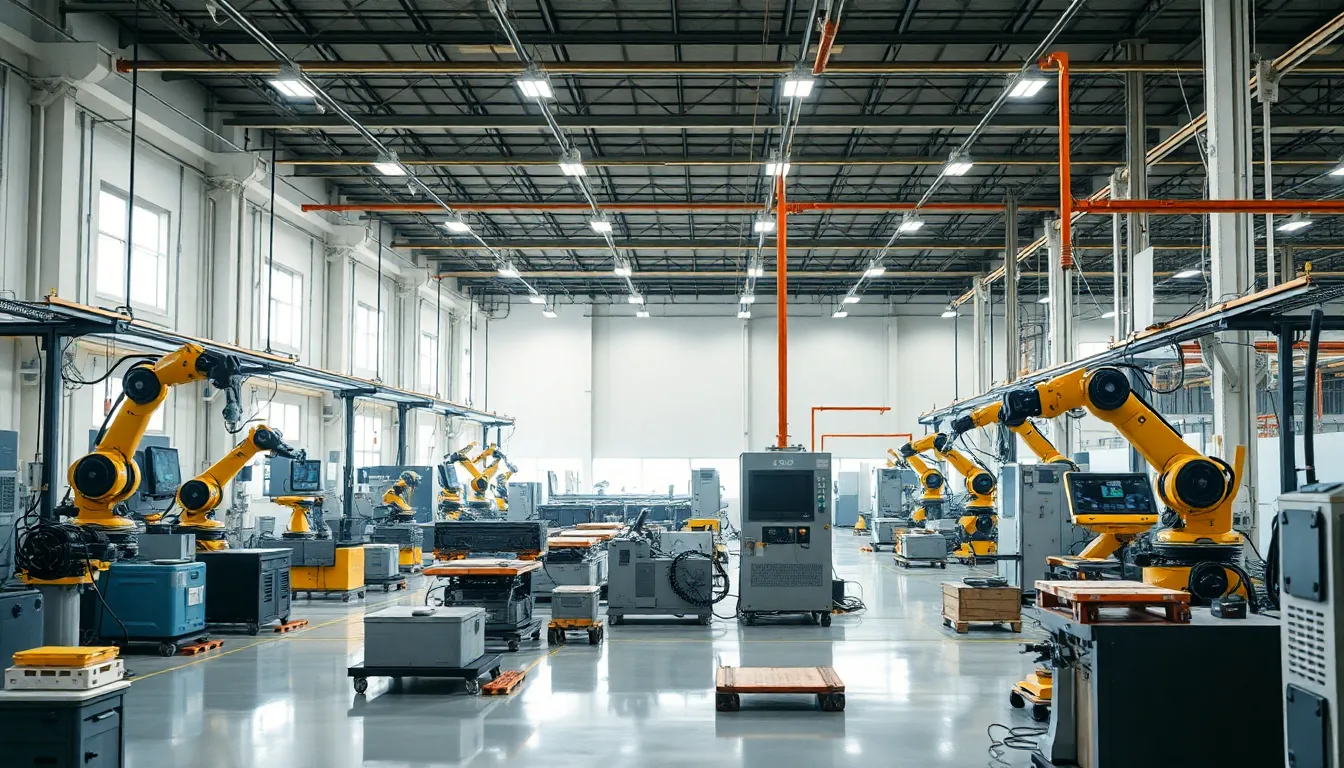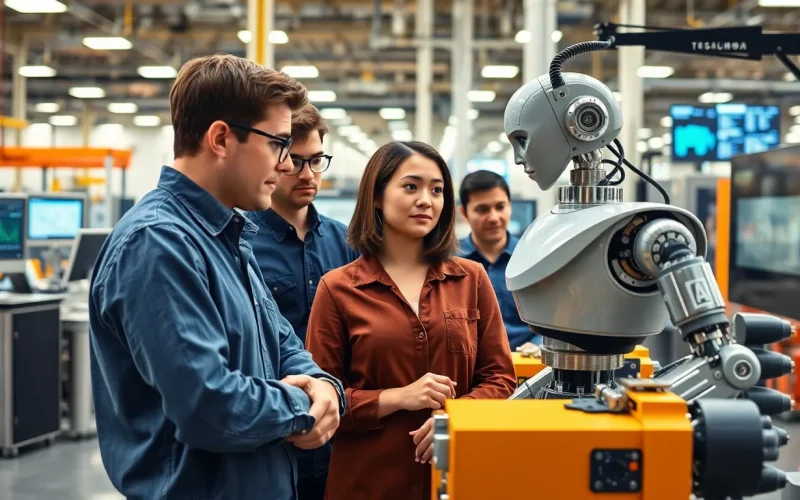Table of Contents
ToggleIn a world where robots are no longer just the stuff of sci-fi flicks, AI is revolutionizing manufacturing like never before. Picture a factory where machines don’t just follow orders but learn, adapt, and even predict outcomes. It’s like having a crystal ball that’s also a workhorse. Manufacturers are discovering that with AI, they can boost efficiency, reduce waste, and maybe even have a little fun along the way.
As companies embrace this tech-savvy revolution, they’re not just cutting costs; they’re redefining what’s possible in production. From smart factories to predictive maintenance, AI is transforming the industry into a well-oiled machine—pun intended. So, buckle up as we dive into the fascinating world of AI in manufacturing and explore how it’s reshaping the future, one algorithm at a time.
Overview of AI in Manufacturing
Artificial intelligence significantly enhances manufacturing processes. AI systems identify patterns and predict potential failures before they occur. With the integration of machine learning, equipment can self-optimize for better performance. Smart factories benefit from real-time data analysis, leading to improved decision-making.
Predictive maintenance emerges as a key application, drastically reducing downtime. Algorithms analyze historical data to forecast when machinery requires service. This proactive approach increases reliability and efficiency, minimizing unnecessary repair costs.
Automation is another critical aspect of AI’s role in manufacturing. Robotics equipped with AI capabilities perform complex tasks with precision and speed. These advanced systems allow for higher production rates and improved quality control.
Data-driven insights from AI facilitate inventory management. They assist manufacturers in maintaining optimal stock levels and reducing waste. Enhanced supply chain coordination results from the use of AI technologies, streamlining operations and improving responsiveness to market changes.
Companies increasingly adopt AI-driven technologies for competitive advantages. Customization options expand as AI allows for flexibility in production processes. Industry leaders leverage these innovations to enhance customer experiences and satisfaction.
Integration challenges exist but can be mitigated through strategic implementation. Training employees on new AI tools is essential for maximizing benefits. Collaboration between technology providers and manufacturers fosters sustainable growth.
AI’s influence in manufacturing redefines operational capabilities, paving the way for future advancements. Continuous investment in AI research and development further propels this transformation. As a result, the industry evolves, tapping into new possibilities and efficiencies.
Benefits of AI in Manufacturing

AI integration transforms manufacturing by significantly enhancing operational efficiency and ensuring superior quality control.
Increased Efficiency
Efficiency gains arise when manufacturers implement AI systems. Automating repetitive tasks reduces production time and minimizes human error. Data analysis identifies bottlenecks in workflows. Real-time monitoring allows for immediate adjustments, preventing delays. AI-driven predictive maintenance decreases unexpected downtime by up to 50%. Additionally, machine learning algorithms optimize equipment performance over time. Factories equipped with AI technologies achieve production increases of 20% or more, contributing to substantial cost savings while maximizing output.
Enhanced Quality Control
Quality control improves dramatically through AI applications. Machine vision systems inspect products in real time, identifying defects that human inspectors might miss. Algorithms analyze production data to forecast potential quality issues before they arise. This proactive approach leads to fewer product recalls and lower rework costs. AI facilitates a consistent standard of quality across products, ensuring customer satisfaction. Moreover, AI systems enable manufacturers to quickly adapt to changing consumer preferences, keeping products aligned with market demand. Implementing these AI-driven processes can result in up to 30% reductions in defect rates, ultimately enhancing brand reputation.
Applications of AI in Manufacturing
AI transforms manufacturing processes by introducing innovative applications. Key areas of focus include predictive maintenance, quality assurance, and supply chain optimization.
Predictive Maintenance
Predictive maintenance enhances machinery reliability, helping manufacturers reduce unexpected downtime. By using AI, organizations can analyze data to forecast when equipment requires servicing. Implementing this technology can decrease downtime by up to 50%. Manufacturers increase efficiency and minimize repair costs through timely interventions. Real-time data analysis enables teams to make informed decisions, ultimately extending equipment lifespan.
Quality Assurance
Quality assurance becomes more effective with the inclusion of AI-driven systems. Machine vision technology inspects products in real time, identifying defects that human inspectors might miss. Algorithms predict potential quality issues before they arise, leading to fewer product recalls. Implementing AI in quality control results in lower rework costs and enhances brand reputation. By addressing quality proactively, manufacturers ensure products meet market demands consistently.
Supply Chain Optimization
Supply chain optimization sees significant improvements with AI integration. Inventory management systems analyze data to maintain optimal stock levels, reducing excess inventory costs. Decision-making becomes more efficient as AI identifies patterns and trends in supply chain operations. Organizations can also respond quickly to market changes, ensuring timely deliveries. This adaptability fosters stronger relationships with suppliers and customers, enhancing overall operational performance.
Challenges in Implementing AI in Manufacturing
Implementing AI in manufacturing presents several challenges that companies must navigate effectively.
Data Security Concerns
Data security remains a significant challenge as manufacturers increasingly rely on AI systems. Unauthorized access to sensitive information may lead to detrimental security breaches. Manufacturers handle vast amounts of data, making them prime targets for cyberattacks. Protecting intellectual property and operational data becomes crucial. Robust security protocols and encryption methods are necessary to safeguard information. Additionally, adhering to regulations like GDPR and CCPA is vital for compliance. Without addressing these concerns, companies risk financial losses and damage to their reputations.
Skill Gaps in Workforce
Skill gaps among the workforce represent another obstacle in AI adoption. Many employees lack the necessary technical skills to work effectively with AI technologies. This deficiency can hinder successful implementation and utilization of AI tools. Manufacturers need trained personnel who can operate, maintain, and optimize AI systems. Investing in employee development through training programs helps bridge these skill gaps. Collaborating with educational institutions can facilitate a talent pipeline equipped for AI roles. Each of these initiatives contributes significantly to leveraging AI capabilities efficiently within manufacturing processes.
Future Trends in AI in Manufacturing
Emerging trends in AI will shape the future of manufacturing. Increased use of machine learning algorithms enhances predictive analytics, further refining operations. As organizations recognize the value of real-time data, they’ll implement AI solutions that adapt to changing circumstances.
Implementations of smart robotics are set to expand. These robots perform complex tasks alongside human workers, boosting productivity and safety in various environments. Seamless collaboration between humans and AI-equipped machines fosters innovation and streamlines processes.
Sustainability efforts will drive the adoption of eco-friendly AI applications. By optimizing resource usage, manufacturers seek to minimize waste and reduce their carbon footprints. AI algorithms can analyze energy consumption patterns, recommending adjustments that lead to lower operational costs and enhanced environmental responsibility.
Furthermore, advancements in AI will focus on quality management. Enhanced machine vision systems will identify defects with greater accuracy, reducing the likelihood of recalls and complaints. Manufacturers can maintain high standards by leveraging AI’s predictive capabilities for quality assurance.
Supply chain transformations will also emerge from AI’s growing presence. By harnessing data analytics, manufacturers can anticipate demand fluctuations and optimize inventory levels to avoid surplus or shortages. Implementing AI-driven logistics solutions facilitates smoother supplier and customer interactions.
Addressing data security will remain a priority as AI adoption increases. Manufacturers must navigate the complexities of cybersecurity, ensuring sensitive information remains protected from potential threats. Collaboration with experts in cybersecurity can aid in developing robust defense strategies.
Lastly, workforce development will evolve alongside AI advancements. Training programs tailored to equip employees with the necessary skills for AI integration will gain importance. Partnerships with educational institutions can further foster a talent pool ready to embrace the manufacturing landscape of the future.
AI is revolutionizing the manufacturing landscape by enhancing efficiency and driving innovation. As companies embrace these technologies they’re not just improving production processes but also setting new standards for quality and customization. The integration of AI in predictive maintenance and quality assurance is paving the way for smarter operations that can adapt to market demands.
While challenges such as data security and skill gaps persist, strategic investments in training and collaboration can bridge these hurdles. The future of manufacturing lies in the continued evolution of AI applications that promise to optimize resources and improve sustainability. With ongoing advancements in technology the potential for growth and transformation in the manufacturing sector remains immense.





